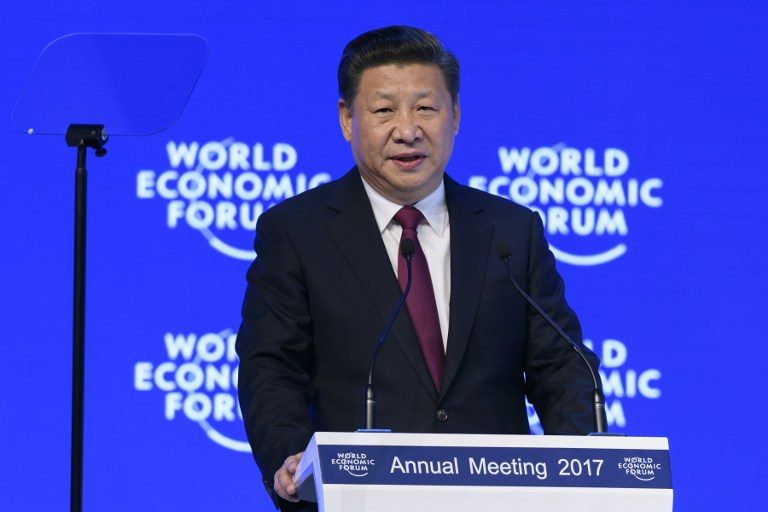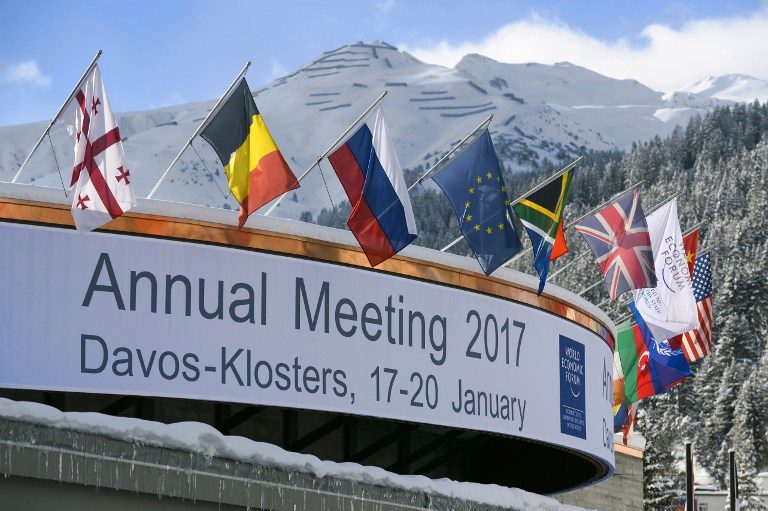SUMMARY
This is AI generated summarization, which may have errors. For context, always refer to the full article.

DAVOS, Switzerland (3rd UPDATE) – China’s President Xi Jinping warned Tuesday, January 17, against scapegoating globalization for the world’s ills or retreating behind protectionist walls, days before Donald Trump takes office.
In what amounted to a rewriting of the global economic order, led for decades by the United States, Xi used his debut speech at the World Economic Forum in Davos to insist that globalization was irreversible despite a populist backlash in the West.
There is “no point in blaming economic globalization for the world’s problems”, he said, saying that the process was not at the root of the Syrian refugee situation or the 2008 financial crisis.
Globalization should be “more inclusive, more sustainable”, he added, adding that currently existing global institutions are “inadequate” and should be more “representative”.
Xi’s keynote address kicked off four days of networking and partying by the global elite in the Swiss ski resort, in a week that climaxes as Trump takes office after a campaign that blamed China and globalization for the loss of millions of US factory jobs.
The Republican property tycoon’s signal pledge is to “Make American Great Again” but Xi warned: “No one will emerge as a winner in a trade war.”
Trump has repeatedly accused China of carrying out trade policies that have led to massive US job losses. He has threatened to slap tariffs of up to 45 percent on Chinese goods.
But addressing a hall packed with government leaders, captains of industry, stars of entertainment and agenda-setting thinkers, Xi issued a rebuke to such thinking.
“Pursuing protectionism is just locking oneself in a dark room. While wind and rain may be kept outside, so are light and air,” he said.
It is simply “not possible” to reverse the flow of global capital, technology, goods and people, Xi added, insisting China was committed to “opening up” and defending globalization’s gains for emerging economies.
The message was music to the ears of the globetrotting Davos crowd.
“It was a clear call from President Xi that he is prepared to take the lead on free trade,” Peter Lacy, a global managing director at Accenture Strategy, told Agence France-Presse.
Perils and parties

Conscious of the sour public mood in the West, organisers are billing the Davos meet as “A call for responsive and responsible leadership”, and top business executives agree that they must not appear oblivious to the anger of ordinary people.
“The advantages of globalization are more clear in emerging markets than in developed countries. We have to listen, to help people that are concerned,” Sergio Ermotti, chief executive of Swiss banking giant UBS, told Agence France-Presse.
A World Economic Forum study said that within advanced economies, median per capita income fell on average 2.4% over the past five years, helping to explain why disaffection is so high across the West.
And the scale of the chasm between the richest and poorest was laid bare by an Oxfam report that said eight men own the same wealth as the poorest half of the world’s population.
The eight include Microsoft founder Bill Gates, who is speaking at the forum this week, and Mark Zuckerberg of Facebook, which like several other companies has remodelled a Davos shop as a promotional “pop-up” venue.
Other research presented by the consultancy Edelman found public confidence in institutions including in governments, business, the media and NGOs slumping across the rich world.
The sense that the world is at a turning point is apparent in the topics of debate at Davos, across hundreds of different panels.
One panel Tuesday discussed “Why facts don’t unify us” any more. Another asked whether the future of work is pregnant with “promise or peril”, given the impact of technology on jobs, a theme that is resonating loudly on the electoral front with Trump’s victory, Britain’s vote to quit the European Union and the rise of far-right parties across Europe.
Away from debates on weighty issues such as reform of capitalism, artificial intelligence and a cure for cancer, Davos attendees including Chinese billionaire Jack Ma and Hollywood star Matt Damon will get to unwind at exclusive apres-ski events dotted around the town.
But the party for “Davos Man” may be drawing to a close if the anti-elite backlash intensifies.
British Prime Minister Theresa May will address the World Economic Forum on Thursday, two days after outlining her vision for Brexit in another keenly awaited speech. – Rappler.com
Add a comment
How does this make you feel?
There are no comments yet. Add your comment to start the conversation.